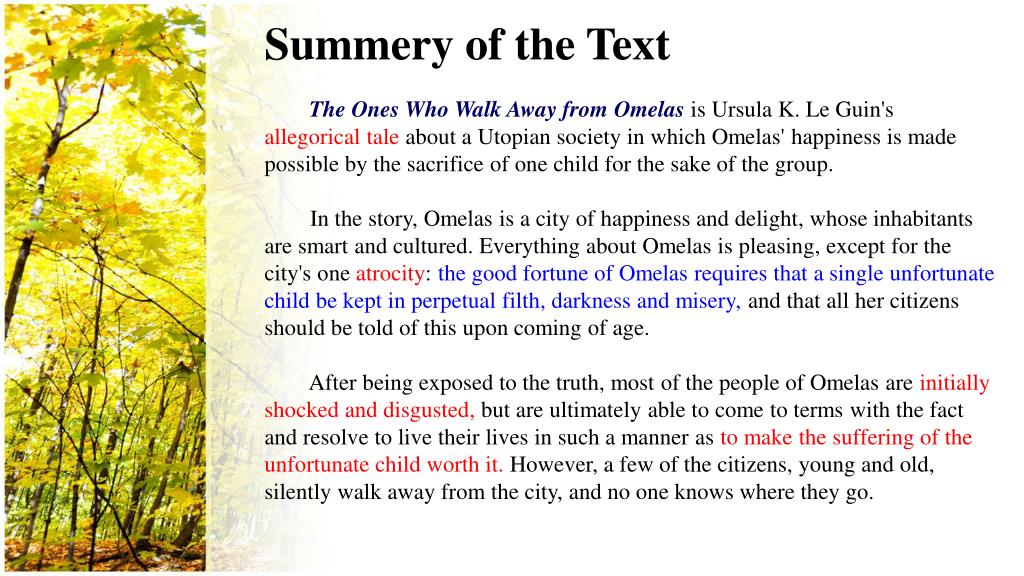

- #The ones who walk away from omelas by ursula le guin download
- #The ones who walk away from omelas by ursula le guin free
The title of the story includes the word “Omelas”, which is … Immediately download the The Ones Who Walk Away from Omelas summary, chapter-by-chapter analysis, book notes, essays, quotes, character descriptions, lesson plans, and more - everything you need for studying or teaching The Ones Who Walk Away from Omelas. Archetypal Criticism of "The Ones Who Walk Away from Omelas" Archetypal Themes (Good vs. The ones who walked away from Omelas is a symbol for morality in the story. Silent and alone, they walk into the darkness beyond the city and never come back. The people of Omelas have a choice to do what's right and what is wrong. These select few are the only ones to turn away from the “norm” and leave the utopian city. The antagonists are the ones who walk away from Omelas. He/she is the main “character” in the story, as he/she is the one to tell the entire story. “The Ones Who Walk Away From Omelas” by Ursula Le Guin and “August 2026: There Will Come Soft Rains” by Ray Bradbury both contain similarities of loneliness and pain but also go separate ways as the each author’s intentions are to direct the reader to … All BS's - whether we R or D - must walk away from Omelas. Learn the roles and relationships of the characters in The Ones Who Walk Away from Omelas, and how they contribute to the plot. The narrator does not know where the ones who walk away go. In this story, the question for the reader author established is would you live in a place where happiness depends on the suffering of another one and obey the rules, or would you be unable to accept the rules. The short story “The Ones Who Walk Away from Omelas” by Ursula K. Only pain is intellectual, only evil interesting.”. She liked the sound of “melas” and decided to add an O to the beginning. The narrator seems to be inventing Omelas as they write. Besides noting Le Guin's recognition of the impossibility of constructing an alternative vision of culture acceptable to all readers, Roemer suggests that unimaginability is an integral component of her Utopian project. "The Ones Who Walk Away From Omelas" is simultaneously a rich description of an imagined utopia and an intellectual exercise. Le Guin is known primarily as a science fiction and fantasy writer, and “The Ones Who Walk Away from Omelas” is notable for being one of the few short stories of the genre to be widely anthologized in collections of general fiction.

It was subsequently printed in her short story collection The Wind’s Twelve Quarters in 1975. The people of Omelas are described as happy, living in an apparently … "The Ones Who Walk Away from Omelas" contains examples of: Arcadia : Averted the narrator specifically shoots down the idea that Omelas is an agrarian paradise and notes their urban nature and advanced technology.
#The ones who walk away from omelas by ursula le guin free
If IT is set free then the town of Omelas will no longer be the perfect society, the author wants you to think it is. In “The Ones Who Walk Away from Omelas” Guin uses characters as the main symbols. The Ones Who Walk Away from Omelas" was nominated … (select in Table of Contents, 52% into preview) 4. One of the underlying themes of "The Ones Who Walk Away from Omelas" is that of the individual vs.

They leave Omelas, they walk ahead into the darkness, and they do not come back…. The main characters of this mystery, mystery story are. In Omelas, the happiness of the society as a whole is valued above that of the child locked up under the city. LeGuin that is about a utopian city Omelas during its Festival of Summer. The Ones Who Walk Away from Omelas is a short story by Ursula K. “The Ones Who Walked Away from Omelas” The American Author, Ursula K Le Guin has written many novels and short stories in the past. The Ones That Walk Away From Omelas Analysis. We would like to show you a description here but the site won’t allow us. Their outer characterization reveals that they are diverse in terms of physical appearance and age.

Le Guin explores the theme of happiness versus suffering through the story’s plot, characters, and the use of contrast. The ones who walk away from Omelas are the people who refuse to take part in the unjust community, they represent those in society who are unwilling to comply to norms if they find them immoral.


 0 kommentar(er)
0 kommentar(er)
